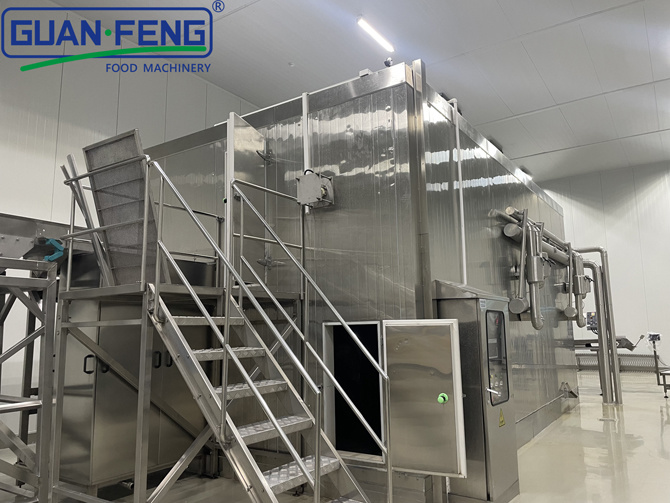BLOG
Focus on hot topics, real-time dynamics
Exploring the Transformative Real-World Applications of Lyophilization Machines in Biotechnology
Exploring the Transformative Real-World Applications of Lyophilization Machines in Biotechnology
Table of Contents
- 1. Introduction to Lyophilization in Biotechnology
- 2. Understanding Lyophilization: Process and Mechanism
- 3. Advantages of Using Lyophilization Machines
- 4. Pharmaceutical Applications of Lyophilization
- 5. Biotechnology Research Applications
- 6. Applications in Agriculture and Food Safety
- 7. Future Trends in Lyophilization Technology
- 8. Conclusion: The Future of Lyophilization in Biotechnology
- 9. Frequently Asked Questions (FAQs)
1. Introduction to Lyophilization in Biotechnology
Lyophilization, commonly known as freeze-drying, is a vital process in biotechnology that enhances the stability and shelf-life of biological products. The demand for lyophilization machines has surged as industries recognize their potential in preserving the integrity of sensitive materials like pharmaceuticals, vaccines, and enzymes. As biotechnology continues to evolve, understanding the practical applications of lyophilization machines is essential for stakeholders across the sector.
2. Understanding Lyophilization: Process and Mechanism
Lyophilization involves three critical phases: freezing, primary drying, and secondary drying. During the freezing phase, the material is cooled until it solidifies. The primary drying phase removes the majority of the water by sublimation, where ice transitions directly to vapor without passing through a liquid state. Finally, the secondary drying phase further reduces moisture content, ensuring the product is adequately preserved.
The machinery involved in this process is sophisticated, featuring precise temperature and pressure controls that guarantee optimal drying conditions. Effective lyophilization requires a thorough understanding of various factors, including the physical and chemical properties of the product.
3. Advantages of Using Lyophilization Machines
Lyophilization machines offer numerous advantages that significantly enhance product quality. Some of these benefits include:
Improved Product Stability
By removing moisture, lyophilization helps maintain the stability of sensitive biological materials, extending their shelf-life significantly.
Preservation of Biological Activity
The process preserves the biological activity of enzymes, vaccines, and other biologically active substances, ensuring they remain effective when reconstituted.
Convenience and Portability
Lyophilized products are lightweight and easy to transport, making them ideal for global distribution and storage.
Cost-Effectiveness
While the initial investment in lyophilization machinery can be high, the long-term savings in terms of reduced waste and increased product longevity make it a cost-effective choice for many companies.
4. Pharmaceutical Applications of Lyophilization
The pharmaceutical industry extensively uses lyophilization machines to enhance the stability of injectable drugs and biologics. Here are a few key applications:
1. Stabilization of Biologics
Lyophilization is critical for biologics, including monoclonal antibodies and proteins, which are sensitive to moisture and temperature. By freeze-drying these products, pharmaceutical companies ensure their efficacy and safety.
2. Vaccine Preservation
Vaccines, particularly those that are heat-sensitive, benefit significantly from lyophilization. This process preserves their immunogenicity and allows for easier storage and transportation.
3. Formulation Development
In drug formulation, lyophilization enables the development of new drug delivery systems, improving the bioavailability and therapeutic effects of medicinal compounds.
5. Biotechnology Research Applications
In addition to its pharmaceutical uses, lyophilization machines play a crucial role in biotechnology research.
1. Sample Preservation
Researchers often use lyophilization to preserve biological samples such as cell cultures, tissues, and microbial strains. This ensures that samples remain viable for extended periods without compromising their integrity.
2. Storage of Reagents
Lyophilization is used to store enzymes and other reagents, maintaining their activity for future experiments. This application is critical in laboratories where consistent results are paramount.
3. Development of Diagnostic Kits
Many diagnostic kits contain lyophilized components, which provide stability during transport and storage, ensuring accurate results when reconstituted.
6. Applications in Agriculture and Food Safety
Lyophilization machines are not limited to pharmaceuticals and research; they also have significant applications in agriculture and food safety.
1. Preservation of Nutrients
Lyophilization is used to preserve fruits, vegetables, and other food products while maintaining their nutritional quality. This method allows for long-term storage without the need for preservatives.
2. Development of Functional Foods
Functional food products that contain probiotics or other bioactive compounds benefit from lyophilization, ensuring that these elements remain effective during shelf life.
3. Food Safety Testing
In agricultural research, lyophilization helps preserve microbial samples for testing, ensuring that food safety protocols are followed effectively.
7. Future Trends in Lyophilization Technology
As technology advances, so do the capabilities of lyophilization machines. The future trends include:
1. Automation and Smart Technology
The integration of automation and smart technologies is transforming lyophilization processes, enhancing efficiency and reducing human error. Advanced monitoring systems ensure optimal conditions throughout the drying process.
2. Sustainable Practices
The focus on sustainability is leading to the development of environmentally friendly lyophilization machines. Reduced energy consumption and waste management are becoming key factors in new designs.
3. Customized Solutions
As industries demand tailored solutions, manufacturers are increasingly offering customizable lyophilization systems that cater to specific product requirements.
8. Conclusion: The Future of Lyophilization in Biotechnology
Lyophilization machines have become indispensable in biotechnology, serving diverse applications from pharmaceuticals to agriculture. Their ability to enhance product stability, preserve biological activity, and improve transportation efficiency makes them crucial in various sectors. As technology continues to evolve, the future of lyophilization promises even greater advancements, ensuring that biotechnology can meet the challenges of tomorrow.
9. Frequently Asked Questions (FAQs)
1. What is lyophilization?
Lyophilization, or freeze-drying, is a process that removes moisture from a product while preserving its structure and biological activity.
2. Why is lyophilization important in biotechnology?
It prevents degradation and maintains the efficacy of sensitive biological materials, such as vaccines and enzymes.
3. How does the lyophilization process work?
The process involves freezing the product, removing moisture through sublimation, and further drying to achieve the desired moisture content.
4. What products benefit from lyophilization?
Pharmaceuticals, vaccines, food products, and biological samples in research all benefit significantly from lyophilization.
5. Are there any downsides to lyophilization?
While the process has numerous benefits, it requires significant upfront investment in machinery and may not be suitable for all materials.
This comprehensive guide highlights the essential role of lyophilization machines in biotechnology. By understanding their applications, advantages, and future trends, stakeholders can leverage these technologies to improve product stability and efficacy, ultimately advancing the field of biotechnology.
Hot Tags:
Contact Us
E-mail:
sales@syguanfeng.com
Tel:
+86 15088506234
Address:
South Industrial Park of Dongguan, Shangyu District, Shaoxing City,Zhejiang Province,China.
GUANFENG, your customization experts!
GUANFENG FOOD MACHINERY - leading supplier of integrated food processing solutions
Copyright© 2024 ZHEJIANG GUANFENG FOOD MACHINERY CO.,LTD.










